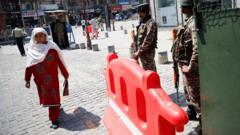The Bharatiya Janata Party is on track to win the New Delhi assembly elections, marking a significant change in a region that had resisted their governance for nearly 30 years.
BJP Gains Ground in New Delhi Assembly Elections Amid Political Turmoil

BJP Gains Ground in New Delhi Assembly Elections Amid Political Turmoil
Early results indicate a potential shift in power as Modi's BJP looks set to reclaim control in the capital region's assembly elections.
In an election marked by intense rivalry and aggressive campaigning strategies, the Bharatiya Janata Party (BJP) of Prime Minister Narendra Modi appears poised to reclaim power in New Delhi’s regional assembly. For nearly three decades prior, the capital region had resisted the BJP's Hindu-first political platform, but early results suggest a shift in the voters’ sentiment, with the BJP potentially winning more seats than the current ruling Aam Aadmi Party (AAP).
The AAP has held governance over New Delhi for the past decade, yet it has increasingly faced challenges from Modi’s administration, which has sought to undermine its grip on power. The political contest in the capital encapsulates the fierce nature of Indian politics, where parties engage in aggressive tactics, including AI-driven misinformation campaigns and severe pressure on political opponents.
As voter turnout unfolds, the efficacy of both parties in delivering essential services to a population exceeding 20 million remains critical. Analysts note that a deterioration of basic governance amidst the political turmoil may lead to widespread dissatisfaction among citizens. This unfolding scenario in New Delhi exemplifies the ongoing complexity of regional governance in India, as parties fight fiercely for dominance.
This is a developing story, and updates are anticipated as results are finalized and their implications come to fruition.
The AAP has held governance over New Delhi for the past decade, yet it has increasingly faced challenges from Modi’s administration, which has sought to undermine its grip on power. The political contest in the capital encapsulates the fierce nature of Indian politics, where parties engage in aggressive tactics, including AI-driven misinformation campaigns and severe pressure on political opponents.
As voter turnout unfolds, the efficacy of both parties in delivering essential services to a population exceeding 20 million remains critical. Analysts note that a deterioration of basic governance amidst the political turmoil may lead to widespread dissatisfaction among citizens. This unfolding scenario in New Delhi exemplifies the ongoing complexity of regional governance in India, as parties fight fiercely for dominance.
This is a developing story, and updates are anticipated as results are finalized and their implications come to fruition.




















